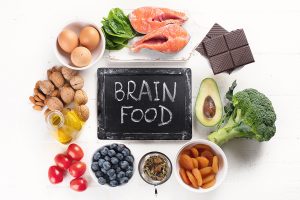 As a healthy senior, what should you eat for your brain? Which foods are protective of neurons and preserve memory and cognition as we age? There are definitely diets that help us keep good moods through food. And they work by improving our gut microflora.
As a healthy senior, what should you eat for your brain? Which foods are protective of neurons and preserve memory and cognition as we age? There are definitely diets that help us keep good moods through food. And they work by improving our gut microflora.
According to The Psychobiotic Revolution: Mood, Food, and the New Science of the Gut-Brain Connection by authors Scott C. Anderson, John F. Cryan, Ph.D. and Ted Dinan, M.D., everyone—but especially seniors—should be eating a healthy diet following certain guidelines that replenish intestinal bacteria.
Like the USDA Food Pyramid, eat plenty of the foods at the bottom of the pyramid, and fewer of those at the top. I’ll list them here in from bottom up on the Psychobiotic Pyramid.
- Vegetables, whole grains, and fruit with each meal
- Include seeds, nuts, herbs and only healthy oils (no processed vegetable oils —olive oil is best)
- Fermented food daily: sauerkraut, yogurt, pickles, soy sauce, miso
- Fish and seafood: two to five times a week
- Poultry and eggs: two to five times a week
- Sweets and red meat: limited amounts once a week or less
Feel Better in Two Weeks
With the dietary recommendations of the authors, who have extensive clinical experience, you will feel better eating a Psychobiotic Diet. If you’re like many healthy seniors, it can be confusing to know what to eat for your brain. These guidelines are designed to promote good moods by eating food that promotes a healthy brain-gut connection.
Of course, nothing is an instant fix. When it comes to improving your gut bacteria, like most things in the body, you need time and persistence.
Remember, your body is a complex system that works in tandem with other health habits, like exercise, good sleep, and emotional relationships. Stress, sedentary habits, and isolation aren’t going to get better by eating a fiber-rich diet and taking probiotic supplements. (Although it helps.)
Stop Eating Junk (Food from Factories)
Besides added sugar, packaged food includes oils and fat from questionable sources that cause inflammation and free radical damage to cells. The best way to be sure you’re not getting food cooked in harmful vegetable oils is to prepare your meals at home using quality extra-virgin olive oil or coconut oil. (If you think it’s too expensive, think about your medical bills from chronic inflammation-caused diseases!)
That one small habit change that alone can bring huge results to your heart and brain. Don’t believe the marketing hype that has led so many to believe that Canola Oil is good for you:
Aside from vitamins E and K, canola oil is not a good source of nutrients. Canola oil may contain small amounts of trans fats, which is harmful to health.
While there is nothing bad about oils from vegetables, it is the processing and manufacturing that results in harmful effects to the body and brain, especially when used for cooking at high heat.
Read Labels, Be Skeptical
Read the labels carefully on all packaged foods. Get a magnifying lens if you have to! Inform yourself, and be aware that big food manufacturers spend big bucks to preserve their reputations online. When I was researching processed oils, it was hard to find sites that mentioned actual scientific evidence.
Even organizations that are supposed to represent heart and disease causes are heavily funded by the large agricultural companies. Some research is funded by big-agra and big-pharma and emphasize results more favorable to their interests.

Recent Comments